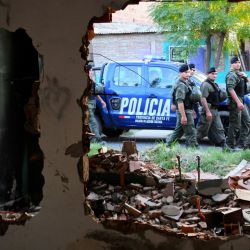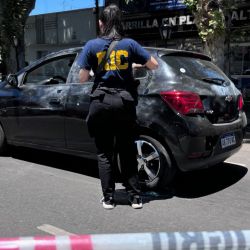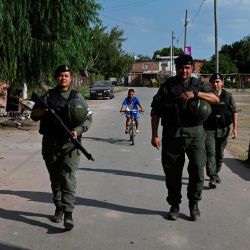President Javier Mile’s government is celebrating, experts suspect agreements with criminal gangs and locals are mistrustful of the temporary piece. Rosario, considered the “narco capital” of Argentina, has reduced murders by more than half since the beginning of the year.
Over the last decade, Rosario has been the most violent city in Argentina. In 2014 there was an explosion of murders – 254 in the calendar year. With some ups and downs, the annual tally has remained around that level until 2023, when 260 victims lost their lives.
Yet something has changed since late last year, when Milei was inaugurated as head of state. With a discourse of zero tolerance to crime and a new governor of Santa Fe Province in place, Maximiliano Pullaro, things have changed.
In his first two months in office, Pullaro, from the centrist Unión Cívica Radical, received some 30 threats from criminal organisations as conditions in prison for their imprisoned leaders were toughened.
Tensions reached a climax in March, when narco leaders in prison ordered hitmen to shoot “ordinary” people. Four workers were murdered. Ever since then, homicide statistics have decreased abruptly.
According to a report from the National Security Ministry, the murder rate in Rosario dropped by 62 percent between January and August from the same period last year.
“We have the lowest number of murders in Rosario in 17 years,” posted Security Minister Patricia Bullrich in celebration on social media.
‘Everything remains the same’
Situated on the Paraná River, Rosario is the nation’s third-largest city and is home to the world's third-largest agro-export port.
However, it has become notorious for narco-trafficking and the violence that accompanies it.
The city’s most famous sons, footballers Ángel Di María and Lionel Messi and their families, have been threatened by local gangs.
In the city’s barrios and low-income neighbourhoods where drug gangs still rule the roost, mistrust prevails.
“We see more police, but everything remains the same. Murders are not on TV, but we still have them,” said Sandra Arce, a 46-year-old homemaker who manages a soup kitchen where 120 families are fed twice a week.
According to Arce, who has lived in the working-class neighbourhood of La Boca for 18 years, the differences are not visible.
“It’s still the same on the streets: they rob you, snatch and grab, have shootouts," she laments.
Nevertheless, she concedes some positive changes. A local point where drugs were sold, opposite her soup kitchen, has been closed down.
For the authorities, there are no half-measures.
“We said we would bring order to prisons and the streets. And that is what we have done,” Pullaro celebrated recently in a speech.
Encrypted messages?
Marcelo Sain, a former security minister of Santa Fe Province, believes that the abrupt drop in violence is not only due to an improvement in the provision of services.
For Sain, who has a PhD in Social Sciences, “there was a pact" made between the state and the criminal world through which “the bloodbath stopped.”
“There’s no other explanation, because there is no other policy in the world that makes murders drop so sharply," he added.
Ariel Larroude, the director of the Observatorio de Política Criminal (“Criminal Policy Observatory”) at the University of Buenos Aires (UBA), finds the drop in violence “striking” because “drug consumption is still increasing.”
In an interview, he recalled that “neither large cities with similar issues, such as Medellín or Cali [in Colombia] in the late 1980s and early 1990s, experienced such a dip in the number of deaths in less than six months.”
But, the expert said, “this could be the result of an exceptional success in criminal policy,” based on “a rearrangement” of the police and prisons.
But it is also possible, he said, that “there was a great tacit agreement with gangs to reduce violence, turning a blind eye on the sale of drugs,” Larroude said.
The lawyer explained that “such agreements need not be thought of as part of a movie, where clan chiefs and high chiefs of police get together in a warehouse and hold a pact."
Police may simply have stopped surveilling certain corners or neighbourhoods with the same ferocity.
“Those decisions create encrypted messages that are easy to decode for groups that are used to dealing with violence," he said.
related news
by Luciano Couso, AFP






















Comments